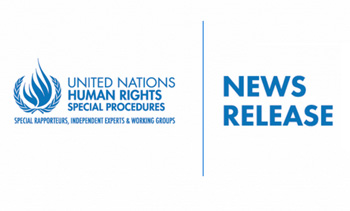GENEVA (29 July 2020) – The UN Special Rapporteur on the rights to freedom of peaceful assembly and association has hailed as groundbreaking an authoritative new interpretation that the right to peaceful assembly extends to digital activities.
“I am excited by this truly landmark affirmation that protection of the right to peaceful assembly extends to remote participation, including online assemblies,” said Clément N. Voule, reacting to a document released by the UN Human Rights Committee today. “It is particularly relevant during the COVID-19 pandemic, when so many peaceful gatherings have moved online.”
The Human Rights Committee, the body of independent experts that monitors implementation of the International Covenant on Civil and Political Rights by its State parties, released its first-ever interpretation of Article 21 of the Covenant, which in 66 words asserts the right to peaceful assembly. The Committee document, General Comment 37, is the culmination of two years of broad global consultations with civil society and experts, including with Voule and his predecessors, who had extensively pushed for such a document to be adopted.
“By focusing extensively on the intersection of digital technologies and the right to peaceful assembly, General Comment 37 sets out a clear framework to protect this fundamental right in the digital era,” said Voule. “It firmly settles the debate about whether the right to peaceful assembly extends to online activities, says governments should not block or hinder Internet connectivity in relation to peaceful assemblies, and questions the chilling effect of surveillance technologies.”
The Committee’s interpretation will be important guidance for judges in national and regional courts around the world, as it now forms part of what is known as ‘soft law’, he said.
“I urge States to protect peaceful assemblies online as well as offline,” said Voule. "During the current Covid-19 pandemic, when many peaceful gatherings have moved online, governments should strive to create an enabling environment for people to gather online and continue to access and use digital technologies to organise, participate in and monitor in-person assemblies.”
ENDS
Mr. Clément Nyaletsossi Voule (Togo)is the Special Rapporteur on the right to peaceful assembly and association.
The Special Rapporteurs, Independent Experts and Working Groups are part of what is known as the Special Procedures of the Human Rights Council. Special Procedures, the largest body of independent experts in the UN Human Rights system, is the general name of the Council’s independent fact-finding and monitoring mechanisms that address either specific country situations or thematic issues in all parts of the world. Special Procedures experts work on a voluntary basis; they are not UN staff and do not receive a salary for their work. They are independent from any government or organization and serve in their individual capacity.
Information on General Comment 37 can be found here and the text in English here.
For more information and media requests, please contact Stefan Wellauer (+41 22 917 8384 / This email address is being protected from spambots. You need JavaScript enabled to view it.)
For media enquiries regarding other UN independent experts, please contact Renato de Souza (+41 22 928 9855 / This email address is being protected from spambots. You need JavaScript enabled to view it.) and Kitty McKinsey (kmckinsey@ohchr).
Follow news related to the UN’s independent human rights experts on Twitter: @UN_SPExperts.
